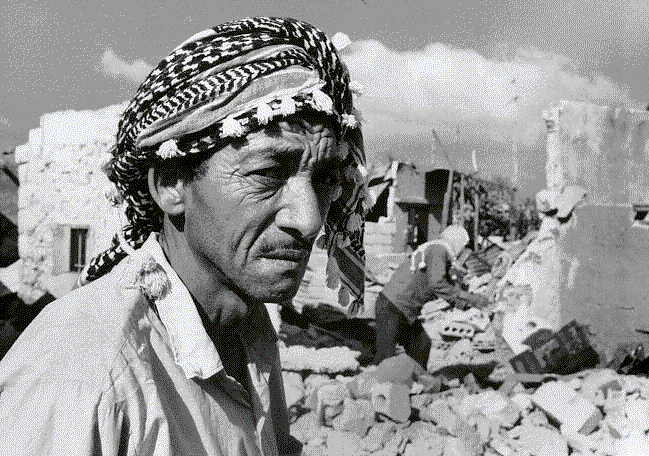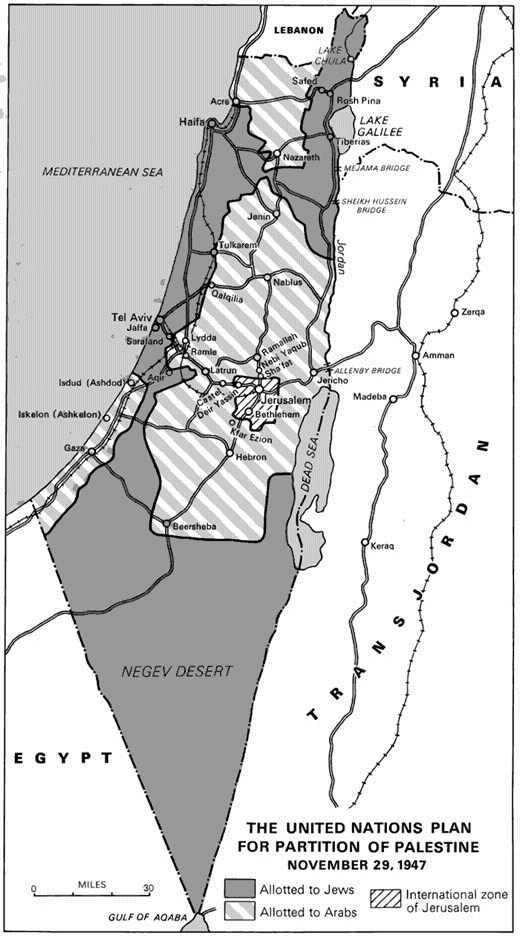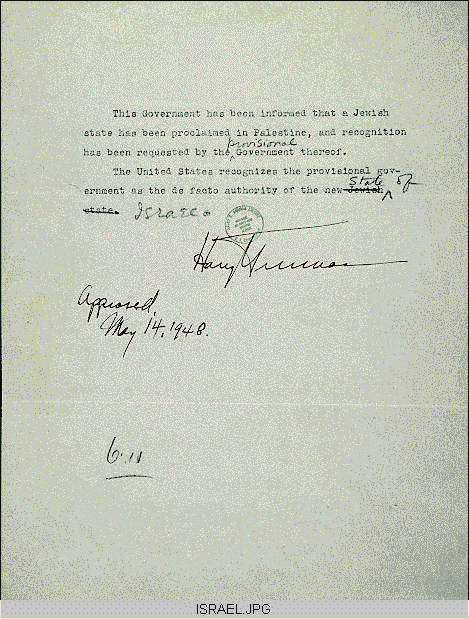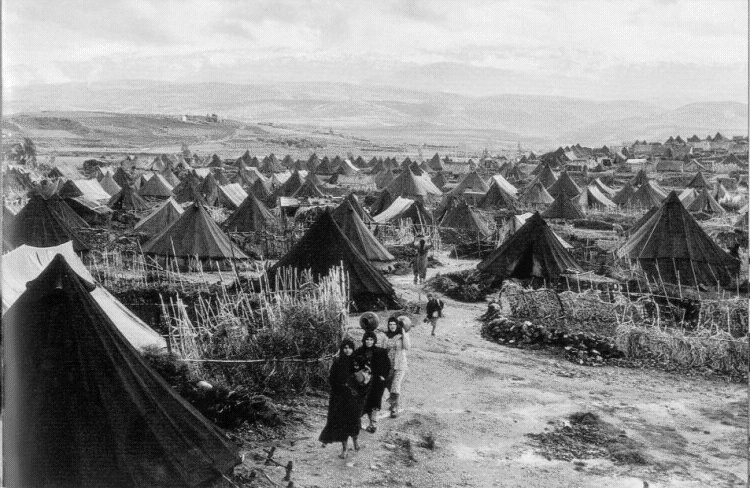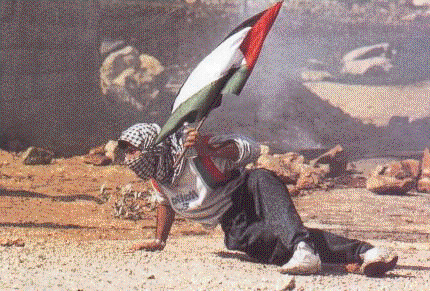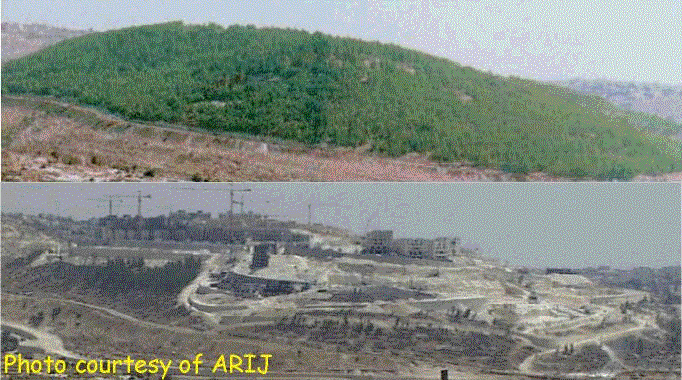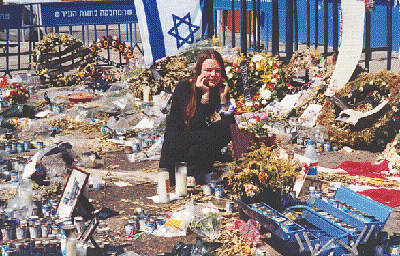Alternative Insight
The Mid-East struggle
Trajectory to Catastrophe
Part I- The Fate of the Palestinian People
For the last 50 years, Israel 's pursuit of security has guided it into a roller coaster of conflicts. During the same decades, Palestinians' collective pursuit of self-determination has guided the community into a roller coaster of deterioration. Let's start with the fate of the Palestinians.
Establishing a Trajectory of Destruction
The policy strategists who officiated the many resolutions, meetings, policies, agreements, accords and temporary halts to the violence in the Mid-East have one thing in common - their efforts have not proved effective and have left the Palestinians and the Israelis on paths towards total ruin.After the British became discouraged in trying to enforce the League of Nations mandate, the newly created United Nations attempted to resolve decades of animosities, violence and counterviolence that had afflicted the Zionist and Arab peoples in Palestine. The UN voted on November 29,1947 to partition Palestine into Jewish and Arab states. The world body decision could not prevent the paths to ruin.
The summary of the UN Resolution 181 document of 19 November 1947, that recommended partition, described the territory division as:
- A Jewish State covering 56.47% of Mandatory Palestine (excluding Jerusalem) with a population of 498,000 Jews and 325,000 Arabs;
- An Arab State covering 43.53% of Palestine, with 807,000 Arab inhabitants and 10,000 Jewish inhabitants;
- An international trusteeship regime in Jerusalem, where the population was 100,000 Jews and 105,000 Arabs,
and defined General Assembly plans:
- a two month interim period beginning August 1,1948, date of expiry of the mandate when the British troops were to be evacuated, with a zone including a port to be evacuated in the territory of the Jewish State by 1st February;
- a five-country Commission (Bolivia, Denmark, Panama, Philippines, Czechoslovakia) in charge of the administration of the regions evacuated by Great Britain, of establishing the frontiers of the two states and of setting up in each of them a Provisional Council of Government; the gradual take-over of the administration by the Provisional Council of Government in both States, and the organization of democratic elections for a Constituent Assembly within two months
Divided Palestine
At the time of UN resolution 181, 85% of the Jewish population remained confined to three urban centers and their surrounding areas, Tel-Aviv, Haifa and Jerusalem. For this reason, areas of large Palestinian populations were incorporated into the Jewish state. In effect, the resolution created a Palestinian state with a predominant Palestinian majority and a quasi bi-national state in which the Jews had an uncomfortable majority.
By not implementing originally conceived plans before the British evacuation - a 5-country provisional administration of the territories and international trusteeship of Jerusalem - the UN General Assembly invited disorder. The world body did not provide enforcement and safeguards to all parties. The UN inaction permitted the future to be determined by predictable crises:
- The Jewish state could not exist with an unusually large proportion of hostile Arabs.
- The Arab nations agressively asserted they would not permit the Jewish state to exist.
- The Palestinians did not have the political and social mechanisms to form a central government that guaranteed its existence.
UN resolution 181 caused a more serious crisis than it attempted to prevent. Its contradictory recommendations and unenforceable provisions contained the seeds of continuous violence against the Israeli nation and ruin of the Palestine community.
A perspicacious, but indecisive President Truman expressed anguish at the lack of an enforcement body to prevent violence and counterviolence against Jews and Palestinians and noted its possible consequences. Statement on the United Nation's recognition of Israel by President Truman, March 25, 1948, Truman archives:The United Kingdom has announced its firm intention to abandon its mandate in Palestine on May 15. Unless emergency action is taken, there will be no public authority in Palestine on that date capable of preserving law and order. Violence and bloodshed will descend upon the Holy Land. Large scale fighting among the people of that country will be the inevitable result. Such fighting would infect the entire Middle East and could lead to consequences of the gravest sort involving the peace of this nation and of the world.
The United States proposed a plan to the United Nations that deserved more attention:
The United States has proposed to the Security Council a temporary United Nations trusteeship for Palestine to provide a government to keep the peace…Trusteeship is not proposed as a substitute for the partition plan but as an effort to fill the vacuum soon to be created..
The Zionists declared their own provisional government in their state one day before Britain's early withdrawal from its mandate. The Palestinians had no provisional government. Truman immediately recognized the provisional government.
Palestinian life declined in their homeland.
The world community failed to implement satisfactory solutions to the problems in the immediate aftermath of UN resolution 181 that partitioned Palestine and initiated the decline in Palestinian life.
- The United States government failed to coordinate its own President's and State Department's appeals.
- The UN initiative stagnated after the assassination of its representative Count Folke Bernadotte by Zionist extremists. After a truce between belligerents in 1948, Bernadotte had devised a plan to resolve the situation. The UN failed to bring the murdered Bernadotte's plan to fruition.
- The United Nations plan could not prevent the 1948-49 hostilities between Israel and the Arab states that ended with Israel's incorporation of other portions of Palestinian territory and people.
- The world failed to obtain the return of 725,000 Palestinian refugees (UN figure) to their lawful properties.
The crisis continually reinforced itself.
Israel felt threatened and did not allow re-entry of the Palestinians to their legitimate homes. Meanwhile, in the decade after partition, Israel followed the process for which it was created, and accepted hundreds of thousands of emigrant Jews, many of whom left Arab countries. An estimated 400,000 came from North Africa, 50,000 arrived from Yemen and tens of thousands proceeded from Syria, Iraq and Iran. While constructing a Jewish state, the emigration process indirectly and unwillingly resulted in the decline of ancient and well established Jewish communities in the mid-east and North Africa, in Baghdad, Cairo, Kairouan-Tunisia. These communities had been a significant part of the Jewish experience, its culture and history. Jewish people, who had homes in other impoverished Arab countries where they had lived for generations, gained opportunity to improve their lives. Palestinians, who had lived for centuries in a land, went to an uncertain positions in impoverished Arab lands.The new Israeli state turned Jews of different cultural backgrounds into a common identity as Israelis. Coincidentally, the tragic events for the displaced Palestinians, began to shape their common destiny into a national identity.
The people, whom the world forgot, shaped a national identity.
In Kuwait, in October 1959, a group of five persons organized the Fatah, acampaign to liberate Palestine. Arafat's Fatah, evolved into the Palestine Liberation Organization (PLO). eventually became accepted by the UN as the spokespersons for the Palestinian people and attained status as the Palestinian Authority (PA). History will debate if the PLO has been beneficial to the Palestinian people and if it caused Israel to become more fearful and aggressive. History will not debate that the world neglected the rights of the Palestinian people and that Arafat and his associates, despite their unapproved methods, brought the Palestinian's increasing deprivation to the world's attention and gave them a new stategy in their efforts --forging a national identity. By not ameliorating the Palestinian dilemma and not providing a suitable approach to an increasingly polarized situation in the Mid-East, the world bodies failed to prevent the hostility and suspicions that led to the 1967 war between Israel and adjacent Arab states.
The 1967 War and its Aftermath
In the 1967 war, Israel captured all of Jerusalem, the entire West Bank, Syria's Golan and Gaza, and initiated an occupation. Except for China's occupation and retention of Tibet and also some minor border lands from India and the Soviet Union, all of which China claimed as an integral part of a historical China, no nation since the end of World War II has been allowed to retain land by conquest. Some nations have acquired previous colonial territories, such as India incorporating Portuguese Goa and China reclaiming British Hong Kong, but no territory has been acquired by military conquest. In many cases, even countries that incorporated adjacent lands before and during WWII have been obliged to retreat from those lands and return them to the original inhabitants. Israel expanded its territory in both the 1948 and 1967 wars and has remained in the expanded areas. The occupation of the West Bank, all of Jerusalem, and Gaza brought the entire Palestine population that had not joined the Palestinian Diaspora under control of Israel authority. The hostilities created an additional ~350,000 Palestinian refugees in outlying lands, many of whom had already been refugees in West Bank and Gaza since the1948 war. The UN reacted to Israel's occupations with several UN resolutions meant to prevent Israel from modifying the legal rights of the Palestinians in their occupied lands.Most well known is UN Security Council Resolution 242 of November, 1967, which became internationally accepted as a basis for Mid-East peace. The key provisions of Resolution 242:
1. Affirms that the fulfillment of Charter principles requires the establishment of a just and lasting peace in the Middle East which should include the application of both the following principles:
- Withdrawal of Israeli armed forces from territories occupied in the recent conflict;
- Termination of all claims or states of belligerency and respect for and acknowledgment of the sovereignty, territorial integrity and political independence of every State in the area and their right to live in peace within secure and recognized boundaries free from threats or acts of force;
2. Affirms further the necessity;
- For guaranteeing freedom of navigation through international waterways in the area;
- For achieving a just settlement of the refugee problem;
- For guaranteeing the territorial inviolability and political independence of every State in the area, through measures including the establishment of demilitarized zones.
Egypt, Jordan and Israel initially accepted Resolution 242. The PLO consistently rejected 242 until the year 1988, at which time Israel no longer heeded the Resolution. The PLO based its rejection of Resolution 242 on the principle that the resolution dealt with the Palestinians as refugees rather than as a people with national rights. Suspicions and a vague wording (what was meant by territories?) kept Resolution 242, a land for peace formula, as words on a document.
The dispersal of the Palestinians increased their tensions with Arab nations, especially Jordan.
A displaced people becomes further displaced.
Although sympathetic to the Palestinian's tragedy, the PLO's activities within the Hashemite kingdom troubled Jordan's King Hussein. The Palestinians paid the price. In a civil war in 1971, Jordan military actions resulted in Palestinian deaths and intensified the anguish of the displaced people. Hussein forced the PLO and many Palestinians to leave Jordan. The beleaguered PLO set up bases and an infrastructure in Lebanon.After disastrous and vilified terrorist actions against the Israeli state and its citizens, the PLO softened its position sufficiently and convinced the UN they were the legitimate representatives of the Palestinian people. In 1974, after Arafat addressed the United Nations, the world body voted to give the PLO observer status and approve the Palestinian right to self-determination.
The PLO, recognized by the UN as spokespersons for the Palestinian community, again lost its foundation.
Israel considered a firmly rooted PLO in Lebanon as a continuous threat. On June 6, 1982, after a year of agreed upon peaceful truce between Israel and the PLO, Israel's military under the leadership of Ariel Sharon invaded Lebanon. One objective - to demolish the growing PLO infrastructure and drive the PLO, the principal hope for Palestinian escape from occupation, out of Lebanon. Israel succeeded. American negotiator Philip Habib negotiated a Palestinian withdrawal from Beirut to Tunisia. An American and European Multi-National Force (MNF) arrived to ensure the safe departure of the PLO. The fate of the Palestinians continued on its trajectory to destruction.Israel's control of Palestine and its life intensified the anguish of the Palestinian people. Ineffective assistance by the world community to their desperation drove the Palestinians to counter repression with rebellion.
Intifada
After twenty years of seeing olive trees destroyed, water wells demolished, village mayors dynamited and feeling their lives being controlled and humiliated by the Israeli occupation, the Palestinians rebelled. On December 8, 1987, an Israeli tank swerved into a line of cars containing Palestinian workers, killing four men and critically wounding seven others. In protest, an Intifada erupted in demonstrations, strikes, riots and violence in Gaza Strip and the West Bank. Unlike earlier forms of protests, the Intifada had broad appeal, wide support and a long duration of almost seven years. It had a promising aftermath - the Oslo accords and installation of the Palestine Authority as a governing body in the West Bank and Gaza.During the first Intifada, a total of 1,392 Palestinians were killed (ED: some by their own people), 130,787 suffered injuries, 18,211 were detained and 185,000 trees were destroyed (Source: Palestine Human Rights Information Center, June 1994). The injuries and detentions, in which the bones of Palestinian men were broken, prevented them from earning a living and serving as appropriate husbands and fathers. The working conditions that required Palestinian workers in Israel to wake at 3 AM, travel long distances, wait two hours at border crossings, work 8 hours, and finally return home late in the evening, stressed their existence. As the trajectory to destruction of Palestine life continued, the PLO made a historic pronouncement.
On November 15, 1988 the PLO proclaimed "the establishment of the State of Palestine on our Palestinian territory with its capital Holy Jerusalem." The PLO also formally accepted Resolution 242 as the basis for a Middle East settlement. Their statement indicated acceptance of the partition plan and therefore recognition of Israel as a sovereign state.The disastrous effects of the Intifada on Israeli life and the PLO acceptance of Resolution 242, one condition for more agreeable attention from the United States, ushered in a hopeful peace process.
The Peace Process
During the years of the peace process, 1993-2000, the Palestine Authority (PA) under the direction of Yasser Arafat, failed to establish a democratic political process and provide adequate effective economic and social mechanisms. Most first hand observers described the PA as corrupt, disregarding human rights, and operating with bribes, coercion and extortion. What should have been a new direction for the Palestinian people instead weakened their popular resolve, de-motivated their actions and left them as a people without leadership. After seven years of negotiations, the peace process evolved to a double punch of increased oppression and general madness.After the Oslo accords, Palestinian economic and social life actually declined.
The Center for Policy Analysis on Palestine in a report by Dr. Mustafa Barghouti, Summer 1998, entitled, The Post-Oslo Impasse, relates:
The World Bank and other financial institutions state that the Gross National Product in the West Bank and Gaza declined by 18 percent from 1991-1996 and individual purchasing power declined by 35 percent.The peace process ended with a hurried and confusing American proposal. After the stalemate at Camp David II in July, 2000, and Sharon's provocative walk on the Temple Mount, the two parties were completely at odds with one another. The most accepted reason for the PA loss of faith - Israel's continued settlement expansion, although knowing the intransigence would deter the peace process and cause uncontrolled violence.
From a Palestinian forest to an Israeli settlement
The Settlements
Just a few zealots who want to live in ancient Israel, and just a few outposts to guard any entry to Israel, escalated to 450,000 settlers (including East Jerusalem) who needed breathing room, natural growth, connecting roads, infrastructure and military presence for protection.
Israel's intentions in creating the settlements create questions:(1) If, as Sharon has stated, the settlements were not an impediment to peace and the Palestinians are insincere in stating otherwise, why didn't Sharon stop the settlements and expose Arafat's insincerity? This exposure would have brought world opinion to Israel's side.
(2 ) Why did Israel have settlements deep in Gaza, on the Egyptian border and in the Jordan valley close to Jordan? The logistics for maintaining those settlements required roads and infrastructure deep in Palestinian territory. The combination of interfering logistics and unnecessary land utilization created friction and problems.
(3) Do the many and confusing reasons for construction of the settlements disguise an intent to establish the physical infrastructure and political institutions for incorporating the West Bank into Israel and using Gaza as a military outpost?The failure of United States negotiators to prevent Israel's maintaining and increasing the settlements produced the next stage in the violent conflict - provocation leading to terrorism.
Terrorism
The horrific terrorist attacks, such as on a night club frequented by youth in Tel Aviv, are inexcusable and deserve strong condemnation. These attacks are usually performed by extreme groups that appear in rebellions when other means of translating rage to legitimate actions are suppressed. Terrorism does not diminish the extent of oppression of the Palestinian people and should not be allowed to change the focus of that oppression. In the night club bombing the media did not clearly highlight that the night club attack occurred after Israeli F-15 warplanes bombed targets in Gaza and killed many civilians.Collective punishment is against international law. Retribution against the Palestinian people for terrorist attacks is a form of collective punishment. Terrorist actions occur in many countries in the world and are addressed by engaging the specific terrorists and by patient understanding of grievances.
In Spain, the Basque movement has been bombing public and government places for decades. The Spanish military has never attacked the Basque people.
In Great Britain, IRA terrorists have murdered many British people in wanton attacks. Great Britain has never taken military actions in retribution against the Irish people.
In the United States, Timothy McVeigh's terrorist attack in Oklahoma City was not countered with government attacks on para military groups allied in expression with Timothy McVeigh.
In China, terrorist actions by Uighur nationalists have not resulted in collective punishment to Uighur people.
The confrontational settlements and terrorist responses to them have produced a volatile situation. That volatility has increased military control and suppressed Palestinian life in the West Bank and Gaza. For 30 years the world community has remained ineffective in preventing the awful fate that awaits the Palestinians - the total destruction of their community.
Finalizing a Trajectory of Destruction
The inability of Israel's power to stop the violence, its stubbornness in changing its policies and its failure to halt the provocative settlements, questions Israel's intentions and strategy. If provocations are followed by counter provocations and by terrorist acts that harm Israelis, why doesn't Israel adopt another strategy?
No matter the extent of Palestinian aggressive behavior, Israel can raise the ante. No matter how many Israelis the Palestinians injure, Israel can harm the Palestinians by 100 fold. The kill ratio runs 3:1 in favor of Israel. The heavily injured ratio is probably 100:1 in favor of Israel. The conflict has hardly affected Israel's economic and social life. It has been catastrophic to the Palestinians who live in the territories. Their hopes are not enhanced by Israel's attitude to its Palestinian citizens.Israel's policy towards its 1.4 million Palestinian citizens provides a negative signal to those Palestinians that reside in the territories. The discrimination against this minority of Israel's citizens is well known. Palestinians who reside in Israel are insignificantly represented in government ministries (1% is an estimated figure), cannot easily, if at all, purchase property, don't easily obtain loans for housing, and don't receive municipal services and improvements that compare to those of the Jewish citizenry. Israel's Palestinians are not permitted to serve in the military and, for this reason, cannot receive military benefits such as scholarships to universities and monetary allotments for large families. The same restriction does not apply to the ultra-orthodox Jews who refuse military service.
The Western democratic countries, including its many liberal forces and human rights commissions, have not lesened Israel's human right violations of its Palestinian minority or the PA human rights violations to its own people. A perplexing consideration is why Israel isn't bothered by its own actions?
After all, Israel wants to be recognized as a democratic nation and receive support from the mighty democratic nations of the world. Why antagonize other nations? Why antagonize its Palestinian minority? The Israeli Arabs have been agreeable citizens, unlike the Palestinians in the territories they haven't rebelled. If they did they could become a "fifth column" in Israel and more easily damage Israel society. Yet, Israel persists in treating them as second class citizens with discrimination that has no equal in the western democracies.
As Israel's actions provoke terrorism and that terrorism provokes Israel to attack the Palestinians with more military fury, the spiral of violence takes a dangerous trajectory. The trajectory heads towards the complete ruin of the Palestinian people.
The Potential Complete Ruin
The potential complete ruin of the Palestinian community has a distinguishing feature. Foreign people and governments have contributed finances, propaganda and assistance that have fueled a conflict which many perceive as an oppression. Financial and other aid given to Israel have enabled it to create a structure that enforces the oppression. U.S. Congressional debates on China are peppered with the expression: "China can't gain national security by violations of human rights." U.S. Congressional debates never use that expression towards Israel. Although settlements have been declared illegal in several UN resolutions, economic assistance has been provided to Israel for creating settlements and infrastructure in the West Bank. After decades, Israel with world support has achieved great prosperity. During the same time, a great part of the Palestinian people remain in refugee camps and many others have been reduced to misery.President Truman's prophetic words, that he uttered in 1948, "Violence and bloodshed will descend upon the Holy Land," are still heard today. Either time has stood still, or strategists are re-circulating worn out documents in an elusive search for Mid-East peace. The world has brought a UN document that the Palestinians neither had the tools for implementing, nor the inclination to tender, to an ultimate conclusion. Unless the world quickly recognizes the dimension of the Mid-East struggle upon the Palestinian people, the pursuit by Palestinians for self-determination and common expression as a Palestinian nation is over.
A similar tragedy could occur to Israel.
The lack of UN preparation before implementing the partition plan, and the failure of world bodies to react properly to emergencies have subjected Israel to years of unending conflict and gravely endangered its existence.Go to Part II- The Fate of the Israeli Nation alternativeinsight
june 16, 2001
updated slightly Jan 1, 2009HOME PAGE MAIN PAGE 
alternativeinsight@earthlink.net
